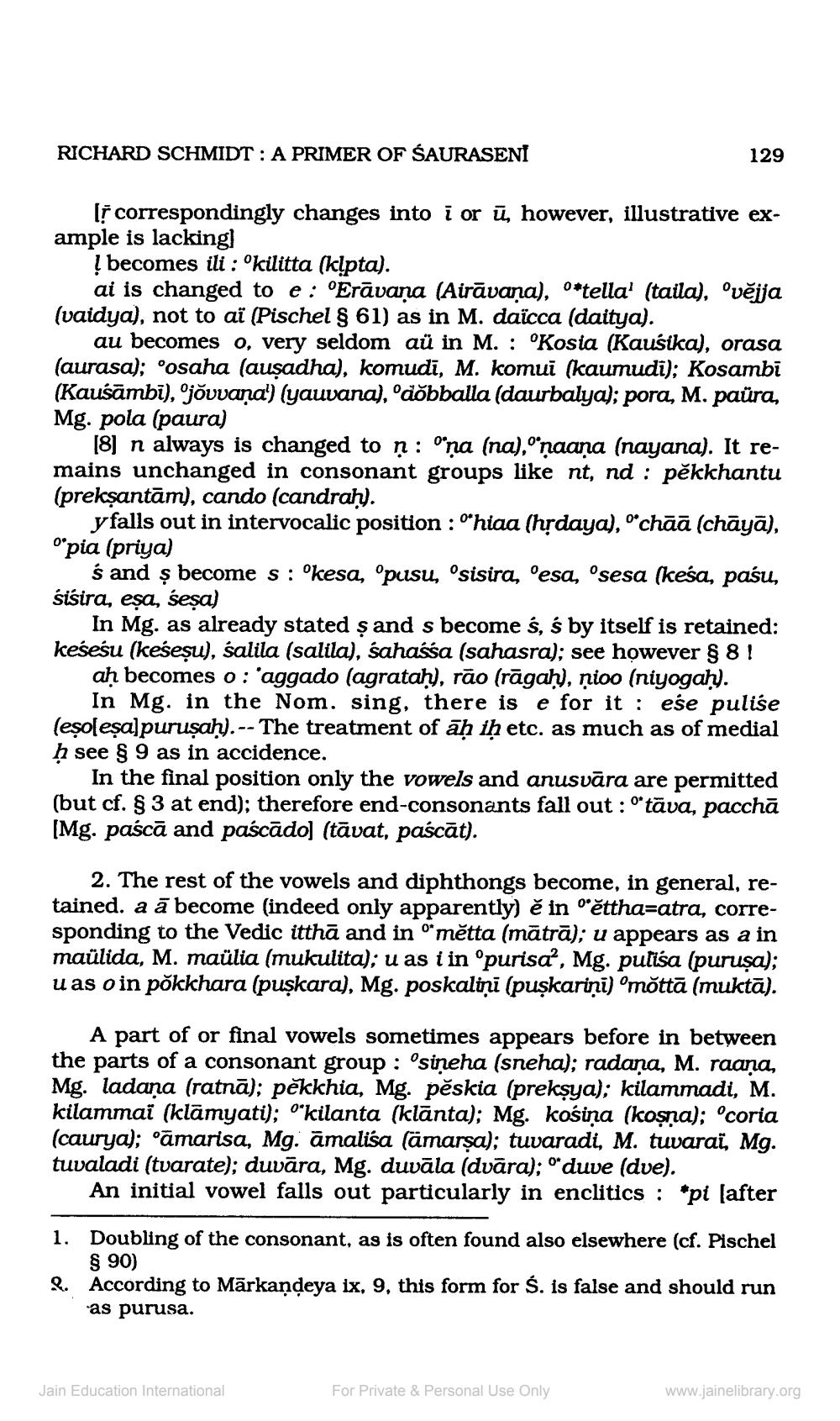________________
RICHARD SCHMIDT : A PRIMER OF ŚAURASENI
129
If correspondingly changes into i or ū, however, illustrative example is lacking!
Į becomes ili : kilitta (kļpta).
ai is changed to e: "Erāvana (Airāvaņa), 0*tella' (taila), 'vějja (vaidya), not to aï (Pischel 8 61) as in M. daïcca (daitya).
au becomes o, very seldom aü in M. : 'Kosta (Kausika), orasa (aurasa); "osaha (ausadha), komudi, M. komui (kaumudi); Kosambi (Kaušāmbi), jõuvaņa) (yawana), 'đóbballa (daurbalya); pora, M. paura, Mg. pola (paura)
[8] n always is changed to ņ: "ņa (na),"naaņa (nayana). It remains unchanged in consonant groups like nt, nd : pěkkhantu (prekşantām), cando (candraḥ).
yfalls out in intervocalic position : Chiaa (hrdaya), 'chāā (chāyā), "pia (priya)
Ś and ș become s : 'kesa, 'pusu, osisira, 'esa, 'sesa (keśa, pasu, śiśira, eșa, sesa)
In Mg. as already stated șand s become ś, śby itself is retained: keseśu (kešeșu), salila (salila), sahassa (sahasra); see however & 8!
aḥ becomes o : 'aggado (agratah, rão (rāgah), ņioo (niyogah).
In Mg. in the Nom. sing, there is e for it : eśe puliše (eşoseşa]puruṣaḥ). -- The treatment of aḥ ih etc. as much as of medial ḥ see 89 as in accidence.
In the final position only the vowels and anusvāra are permitted (but cf. g 3 at end); therefore end-consonants fall out : "tāva, pacchā [Mg. paścā and paścādo] (tāvat, paścāt).
2. The rest of the vowels and diphthongs become, in general, retained. a ā become (indeed only apparently) è in "*ěttha= sponding to the Vedic itthā and in metta (mātrā); u appears as a in maülida, M. maülia (mukulita); u as i in opurisa’, Mg. putiśa (puruşa); uas o in pokkhara (puşkara), Mg. poskaliņi (puskariņi) omottā (muktā).
A part of or final vowels sometimes appears before in between the parts of a consonant group : 'siņeha (sneha); radaņa, M. raaņa, Mg. ladaņa (ratnā); pekkhia, Mg. pěskia (prekşya); kilammadi, M. kilammaï (klāmyati); "kilanta (klānta); Mg. kośiņa (koşņa); ocoria (caurya); •āmarisa, Mg. āmaliśa ämarsa); tuvaradi, M. tuvarai, Mg. tuvaladi (tvarate); duvāra, Mg. duvāla (dvāra); "due (dve).
An initial vowel falls out particularly in enclitics : *pi (after
1. Doubling of the consonant, as is often found also elsewhere (cf. Pischel
S 90) 2. According to Mārkandeya ix, 9, this form for Ś. is false and should run
as purusa.
Jain Education International
For Private & Personal Use Only
www.jainelibrary.org




